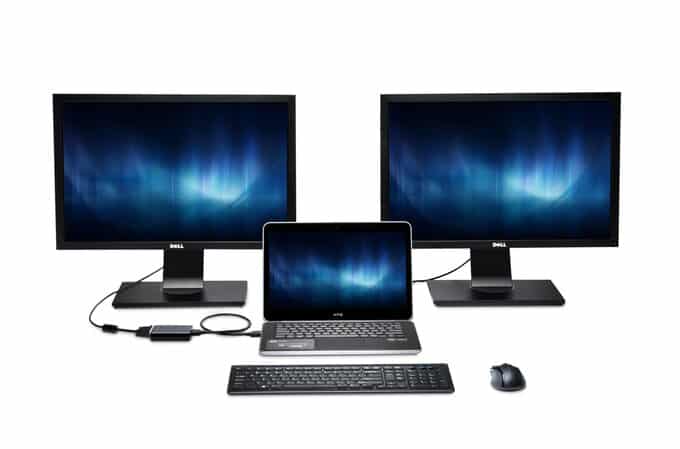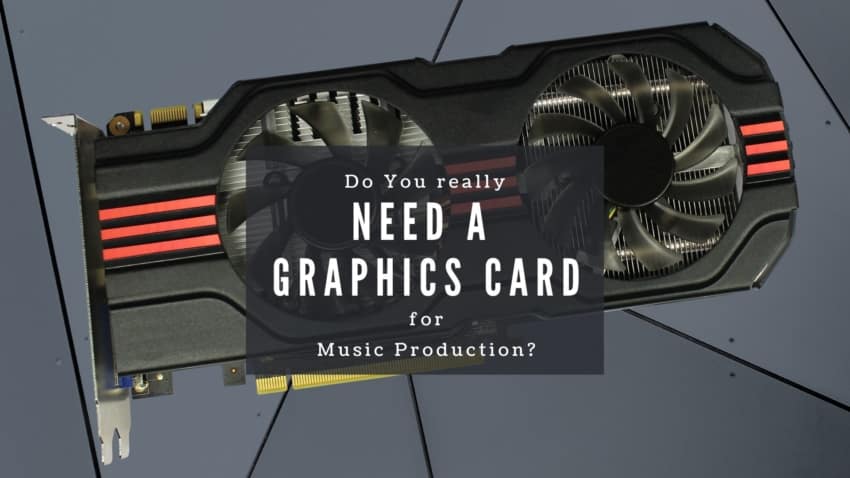Last updated on February 12th, 2021 at 01:16 pm
So, you’re trying to figure out what components are really important to have in your PC for music production, and you ask yourself if a GPU (Graphics card) really is something that you should consider investing in or not.
In this post I will answer this question as well as some other related ones to better help you understand why you may, or may not, want a dedicated graphics card.
Let’s get started…
Do I need a Graphics Card for Music Production?
Yes, you need a graphics card in order to connect your PC to a screen and to get an image on it.
However, you don’t need a dedicated one and the onboard graphics card that comes with your computer is more than enough for the simple fact that in music production you don’t need to process a lot of intensive graphics.
A couple year back one could argue that graphics cards actually did play an important role mainly because if you didn’t have a dedicated card processing the graphics, then the CPU would actually have to do all the work.
This meant that the system itself could potentially slow down a bit and that the processing power of your CPU might not have been enough for your music production needs.
However, modern processors are so powerful that this is no longer an issue.
Now, there are times when you could actually have a reason to get a dedicated GPU.
Is there a reason to get a dedicated Graphics Card?
Yes, there is one reason that comes to mind and that is; connecting two monitors instead of one.
Onboard graphics cards usually just support one monitor, and in music production most people tend to use more than one screen since it’s that much more comfortable.
In this case, yes, you would have to get a dedicated GPU.
However, it doesn’t need to be one that costs you a leg and an arm to purchase, since there are many around the $100 range that can definitely get the job done.
Here’s a classic example of an affordable Graphics Card that will let you hook up two monitors.
Another way would be to use a USB display adapter like this one and connect it to your PCs USB ports.
Using more than two displays
Now, what if you want to go above and beyond and connect three or even four monitors to your PC?
Well, this certainly can be done, but there is absolutely no way that your onboard GPU will support this, and even most dedicated graphics cards don’t as well.

The good news is that getting a dedicated card that can do this isn’t too expensive; here’s a classic example.
In most cases, you won’t need four monitors, but it’s good to know that if you did want them, you could actually use them together.
Connecting a laptop to more than one display
So, I assume that most of you reading this are probably doing it from a laptop and are wondering how to connect it to more than one external monitor, right?
Most laptops have at least one HDMI port or one VGA port, and in this case, you can simply connect to one monitor through those ports.
However, if you want to be able to use three external monitors, you will need to use the same USB display adapter I linked earlier, which connects to the USB port on your computer and then gives you two HDMI ports to work with.
And lastly…
What graphics card brand should you get?
In all honesty, it doesn’t matter.
As long as you can connect more than one display with ease, you should be fine with any of them, also since you don’t really need graphics processing power for music production, it doesn’t matter if you get a powerful one or not.
All that matters is that it lets you hook up the number of monitors that you really need, and in that case, you could even use the USB adapter I mentioned.
What is more important for music production, CPU or GPU?
CPU is the computer’s processor, and the GPU is the graphics card… essentially.
If you read the previous parts of this article you’ll probably know the answer already, since I mentioned multiple times that the graphics card doesn’t play an important role in music production.
CPU (or the processor), on the other hand, is extremely important:
The faster it can process all the information, the better off you will be.
All those VST instruments and effects you like to load up in your DAW require loads of processing power, especially once your project starts getting bigger and bigger and you have multiple instruments and effects running at the same time.
I wrote an entire post on what the minimum and ideal computer specification are for music production, and you should definitely read it if you need to know more about it.
Basically, the CPU is the most important component in your PC as far as music production goes, and the GPU is probably the least important one.
Now, you might also be thinking “what about the sound card, do I really need it for music production?”, and that’s a valid question as well, to which you can find an answer in this post I wrote.
Conclusion
Getting a dedicated GPU makes little to no sense for music production.
If your built-in graphics card doesn’t support running multiple displays, then you could invest in a graphics card that is capable of doing that, but you shouldn’t get one of those expensive ones that have crazy processing power since you won’t be able to take advantage of it.
What is important, however, is the CPU, and if you’re thinking about spending money on a component of your PC to be able to produce music in a better way, this should be it.
I hope this information was useful.
Have a wonderful day!

The author got this wrong by suggesting a graphics card with a fan cooler on it. Cooling fans make noise, and more so as they collect dust or get old and worn. Inexpensive ones with a passive cooler, ie. no fan, are a much more sensible option for music production, and cheaper than the one suggested. Furthermore, two outputs for two monitors are not absolutely necessary, as a DV-I splitter cable will provide the necessary two outputs. Notably, many expensive ‘high-end’ desktop computers that are sold for music production tend to have expensive fan-cooled graphics cards, which is nonsensical and a waste of money. The fact is that they’re really gaming computers being deceptively touted for music production.